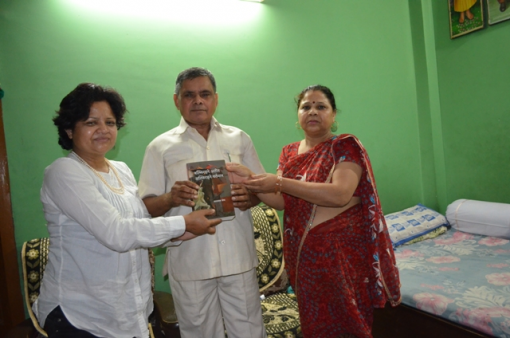
Kathmandu 22 April, 2015: PDRC team represented by president Kamala Hemchuri and program manager Rup Sunar visited New Delhi, India from 11 to 18 April, 2015 to expand the international relationship of the organization. During this visit, the team visited and interacted with numbers of academic and social institutes working for Indian Dalit. Among the organizations visited include Samata Sainik Dal, National Confederation of Dalit Organizations (NACDOR), Dr. K R Narayanan Centre for Dalit and Minorities Studies at Jamia Millia Islamia University and Indian Institute of Dalit Studies (IIDS).
Samata Sainik Dal, a social organization founded by Dr. Bhimrao Ambedkar in 1927, invited PDRC to attend 125th birth anniversary of Dr. Ambedkar. The Ministry of Social Justice and Empowerment, Government of India organized program where the leaders of eminent political parties paid floral tribute at BR Ambedkar’s statue in the parliament house of India. This took place on 14th April, 2015. This event was attended by the high profile dignitaries including President Pranab Mukharji, heads of the eminent political parties, ex-prime minister Dr. Man Mohan Singh and other cabinet ministers etc. This program was fruitful in terms of acquiring greater understanding of Ambedkar and his contribution to the India.
The team then had a meeting with Ashok Bharti, chairperson of the National Confederation of Dalit Organizations (NACDOR) in India. Mr. Bharti told that he is very much delighted to see the change rapidly taking place in Nepal. He further hinted the possibility of conducting joint fellowship and youth exchange programs. Eleonora Fanari, the secretary, Task Force for Socially Excluded (SETF) was also present in the meeting. SETF is the part of Global Call to Action against Poverty (GCAP) and GCAP is the world’s largest civil society movement calling for an end to poverty and inequality.
After that the team met Prashant Negi, coordinator of Dr. K R Narayanan Centre for Dalit and Minorities Studies at Jamia Millia Islamia University, Delhi. Mr. Negi shared how the issues of Dalit and exclusion became one of the central focuses in university curriculum and academia in India, relating it to the University Grant Commission and its role to establish 35 centers on Dalit and minorities studies across the country. He advised Nepal to carry out more quantitative research and study by adopting the data published by the government. “That makes the research more authentic and acceptable” he opined. In addition, he also emphasized the need of building integrated strategy to make the movement successful in both countries. He also urged universities to develop a separate training curriculum to educate social and political leaders on how the entire policy process works.
After that, the team had a fruitful discussion at the Indian Institute of Dalit Studies (IIDS) with its full faculty members. The faculty members acknowledged the importance of equipping next generation of researchers with the relevant latest knwoledge and skills on research methodology. They also shared their hands-on experience on how the extensive research and policy discourse in India is enabling social transformation of Dalit. “We are always willing to share our experience and expertise for the benefit of Nepalese Dalit community” shared Gobinda C Pal, IIDS director.
Copyright © PDRC 2020 | All rights reserved.
Designed and Maintained by Code Logic Technologies Pvt. Ltd.